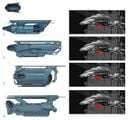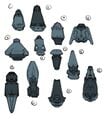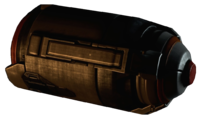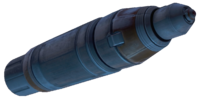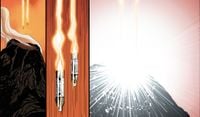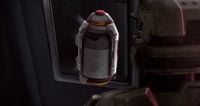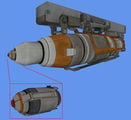HAVOK tactical nuclear weapon
From Halopedia, the Halo wiki
| HAVOK tactical nuclear weapon | |
|---|---|
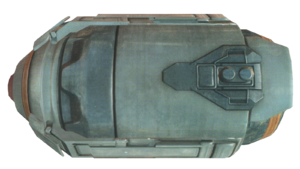 The Mark 2556 excavation-grade HAVOK warhead. The Mark 2556 excavation-grade HAVOK warhead.
| |
| Production overview | |
|
Manufacturer: |
|
|
Type: |
|
| Specifications | |
|
Length: |
13.8 inches (35 cm)[1] |
|
Width: |
7.1 inches (18 cm)[1] |
|
Height: |
7.5 inches (19 cm)[1] |
|
Mvalth-DTPF 80-S | |
|
Filler volume: |
31.4 pounds (14.2 kg) |
|
Yield: |
30 megatons[3] |
| Service history | |
|
In service: |
|
The HAVOK tactical nuclear weapon is a UNSC nuclear weapon produced by the Misriah Armory. It is classified as part of the Medium Fusion Destructive Device category.[1] HAVOK nuclear devices are also nicknamed Brightboys.[4][5]
Variants[edit]
Several variants of the HAVOK nuclear device have been developed for use in different tactical situations, from ordnance deployed by ground forces to missile-based delivery systems.
HAVOK nuclear mine[edit]
The HAVOK tactical nuclear mine[6] is one of the most powerful ground-based nuclear ordnance in the UNSC arsenal, and has a thermonuclear yield of 30 megatons. It is described as looking like a small black half sphere, and does not contain any external indicators; the device only contains a thin slot on the unit's face to allow the detonation key to be inserted. The bottom of the unit contains bonding strips that allows the HAVOK to be attached to any type of surface. The mine can only be detonated by a remote signal, and if the device is placed underneath thick concrete and steel, or other objects that may cause interference, a ground-return receiver must be set up to allow the signal to reach the device.[2]
The HAVOK mine is used in situations where the UNSC must eliminate enemy forces in an area already claimed by them, or to prevent an area from falling into their hands. However, there are situations where the UNSC will use a HAVOK to eliminate Covenant ships deploying infantry and equipment. Nuclear weapons like the HAVOK are employed often but not always, and are only used when all civilian and military populations have been either evacuated, or compromised in a target area.
Variant V[edit]
The Variant V HAVOK is designed to maximize the thermonuclear yield in the vacuum of space.[7] The Variant V HAVOK is a warhead that is attached to a missile and can be launched from either the ground or from a ship.[8]
Mark 2521 MFDD[edit]
The Mark 2521 Medium Fusion Destructive Device is an excavation-grade variant of the weapon. It can be carried on a Pelican and can be stuck on a surface.[9]
Mark 2550 MFDD[edit]
The Havok Bunker Buster 2550 Medium Fusion Destructive Device is an excavation-grade variant of the Havok tactical nuclear weapon that is deployed via airdrop. As a medium-yield nuclear device, the BB 2550 gives off a relatively small amount of radiation when compared to other nuclear weaponry.[10] The device can be armed with an adjustable set timer. After a Havok BB 2550 is airdropped from an aircraft, the nuclear device deploys three helical fins to stabilize its fall.[11] As a bunker-buster weapon, the Mark 2550 is designed to direct most of the energy of the blast downward to maximize damage to subterranean targets.[12]
Mark 2556 MFDD[edit]
The Mark 2556 Medium Fusion Destructive Device[1] is an excavation-grade variant of the weapon, presumably used for excavation purposes in locations where a nuclear blast is required. A single warhead of this variant is stated to be able to turn Ivanoff Station "into a piñata".[13] Despite being excavation-grade, it could be attached to an F-41 Broadsword fighter in the form of a missile for ship-killing purposes. A single warhead was capable of destroying both the Composer and the powerful Forerunner vessel Mantle's Approach when detonated inside of the ship.[14]
Tactical uses[edit]
In 2526, HAVOKs were used during Operation: SILENT STORM. Three were used as part of a successful attack on the Fleet of Inexorable Obedience's logistics train while the main part of the fleet was distracted glassing Biko. Later, they were used alongside octas during the attack on the planet Zhoist and the Ring of Mighty Abundance in orbit. During part of the attack, Spartan-II Blue Team used two HAVOKs to destroy the under-construction Covenant supercarrier Hammer of Faith. This was accomplished by John-117 and Kelly-087 arming the HAVOKs and then tossing them into a gravity lift leading into the ship from a hanger bay in one of its construction barns. Blue Team managed to escape the blast in a group of Banshees, though the Banshees were fried from the gamma effects of the blast and the Banshees own poor gamma shielding.[15]
In 2531, HAVOK Variant V nuclear missiles were carried on the UNSC Spirit of Fire.[8] During the mission to the UNSC Prophecy, Captain James Cutter had the HAVOKs utilized against the Covenant forces along with the ship's MAC gun.[16]
On February 12, 2535, during the Battle of Jericho VII, UNSC NavSpecWep deployed three teams of SPARTAN-IIs on Jericho VII to combat Covenant forces invading the colony. At one point during the engagement Red Team was successfully able to plant a HAVOK near a Covenant rally point where a cruiser was to deploy ground forces while Blue Team was to clear out the rear guard of the Covenant forces so they could slip in. The plan was for the HAVOK to be detonated when the cruiser lowered its shields and landed to drop troops in order to take it out. Red Team succeeded in planting the device, but its unclear if the HAVOK ever destroyed a Covenant ship as the Spartans were recalled shortly thereafter and Jericho VII fell to the Covenant.[17]
In May 2545, the 53rd Armored Division of the UNSC Army detonated two HAVOKs to demolish three Covenant staging grounds during the Battle of Actium. The blasts wiped out much of the Covenant ground forces, but at the cost of no less than 12,000 Army personnel. The battle ultimately ended in a Covenant victory, as Actium was glassed.
On July 17, 2552, during the Battle of Sigma Octanus IV, Blue Team detonated a HAVOK nuclear mine in the city of Côte d'Azur, during the battle taking place on the planet, destroying the city and all the Covenant in it.[18]
In October–November 2552, HAVOK nuclear weapons were used during the Battle for Earth. One notable use was when Blue Team was deployed to Mount Erebus in the Antarctic to destroy a Covenant excavation force using a HAVOK.[19]
In July 2553, in order to destroy a Forerunner installation located in the Montero Cave System on Gao, Blue Team dropped a Havok BB 2550 nuke into an opening in the caverns which detonated and destroyed the installation. The blast also destroyed a dozen MV-29 Wyverns that were above the Well of Echoes pursuing their D102 Owl UNSC Silent Claw. The nuclear blast turned the Well of Echoes into a kilometer-deep shaft of fused limestone with a pool of molten stone glowing for a time at the bottom of the crater. Rather than realizing that the HAVOK was intended to destroy the Forerunner base, President Arlo Casille believed it to be the Spartans way of making good their escape by destroying their pursuers. Rather than admitting the truth about the nuclear blast, Casille chose to cover it up by claiming that the blast was caused by a downed Prowler's reactor going critical, knowing that if the citizens of Gao knew that the UNSC had detonated a nuclear weapon on their planet, they would push for a war with the UNSC that Casille didn't want.[11]
In December 2553, Veta Lopis' Ferret team made use of ten disarmed HAVOKs as decoys during Operation: RETRIBUTION.[20] The team identified themselves to gunrunner Ross Nyeto as pirates who had stolen the HAVOKs from the UNSC Taulanti and, hence, were on the run from Blue Team. In reality, four of the HAVOK shells contained the Ferrets' disassembled and hidden M7S submachine guns, whereas another was in fact a disguised slipbeacon intended to signal their location to the Sahara-class prowler UNSC Silent Joe. After being brought aboard the Mudoat starsloop Stolen Faith, the Ferrets retrieved their weapons from the HAVOKs. With the discovery of the Keepers of the One Freedom's Salvation Base, it was decided that Blue Team would reactivate the nine still-operable HAVOKs by replacing their missing tritium booster cylinders and using them to destroy the base. Linda-058 managed to reactivate six HAVOKs in the time she had on a five-minute timer; Veta protested this because of the presence of human and Sangheili prisoners trapped within the base. With Keeper forces massing around them, however, they were unable to rescue the prisoners. Both Blue Team and the Ferrets escaped in a Turaco while the Silent Joe used Shiva-class nuclear missiles to attack six Keeper ships attempting to escape the blast. The detonation obliterated Salvation Base and killed 90% of the Keeper forces stationed within it; much to Veta's grief, the prisoners were among those killed.[21]
In 2556, the destruction of the UNSC Pillar of Autumn on Installation 04 was discovered to have created deposits of a new element unique to a fragment of the installation known as Alpha Shard. The new element was fatal only to humans and was used in a terrorist attack on Sedra City. To prevent such an attack again, ONI Commander Jameson Locke got Rear Admiral Goodwin to approve the use of a HAVOK to destroy the deposits. Accompanied by forces from the Sedran Colonial Guard, Locke's team undertook a mission to the shard. In order to escape the shard, the HAVOK's emergency fuel cell was used to briefly power a Condor dropship, but this required a manual detonation of the warhead. As Locke and Private Talitha Macer escaped the shard in the smugglers' ship, Colonel Randall Aiken detonated the HAVOK, destroying the deposits and preventing their use ever again.[22]
Seven excavation-grade HAVOK warheads were stored on Ivanoff Station, presumably for excavation purposes rather than tactical ones given Ivanoff's status as a research station. During the Raid on Ivanoff Station by the Didact, the Master Chief had all of the warheads prepared in order to destroy the Composer and prevent the Didact from getting it. After the Didact digitized everyone in the station,[13] the Master Chief took one of these HAVOKs in the form of a missile attached to an F-41 Broadsword fighter and chased after the Didact. During the Didact's subsequent attack on Earth, the Master Chief boarded the Didact's ship, Mantle's Approach with the HAVOK and detonated it, destroying the ship and the Composer.[14]
In the aftermath of the ship's destruction, a Sangheili terrorist attempted to destroy the city of Rio de Janeiro with a smuggled HAVOK warhead; he was ultimately stopped by UNSC special forces operatives.[23]
During the Requiem Campaign, Jul 'Mdama's Covenant stole at least seven HAVOK-class warheads from the UNSC. Fireteam Crimson discovered several nuclear missiles with their warheads missing in a Covenant supply depot in "Cyclone."[24] During an invasion of the UNSC Infinity, the Covenant planted one HAVOK in the ship's Server Room, and six more throughout the Engine Room. The HAVOKs were equipped with active camouflage to hide them from the ship's sensors which was discovered after Fireteam Crimson discovered a Sangheili deploying the warhead in the Server Room. After the warhead was disarmed and the Infinity's AI Roland realized that they were being protected with active camouflage, he was able to lock onto the energy signatures from the camouflage and direct Crimson to each warhead. Crimson managed to disarm all seven warheads with instruction from Roland and secured both the Server and Engine Rooms, keeping the disarmed warheads from being reclaimed by the Covenant until the attack could be repelled.[25][26]
In May 2558, during Operation: WHISTLE STOP, a Longsword dropped two HAVOK missiles on the Kig-Yar pirate queen's base on Ven III as she was launching in a Covenant corvette to engage the UNSC Infinity in space. The HAVOKs destroyed the pirate queen, her base and her launching forces.[27]
In September 2558, an old repurposed HAVOK given to them by the New Colonial Alliance was used by people of Carrow to power their emergency bunker. During the Carrow Conflict, the HAVOK's core was used as the power source for a makeshift EMP weapon to disrupt the Jiralhanae Chieftain Hekabe's control of the vertex and through it the Sharquoi. After Governor Ellis Gass took the vertex for herself, she drew the Sharqoui back inside their hive and detonated the HAVOK, destroying the hive, the hundreds of thousands of Sharquoi inside and part of the nearby city of Suraka. Later scans by the UNSC frigate UNSC Welcome to the Snipehunt confirmed that the HAVOK appeared to have taken out all of the Sharquoi, though plans were made to keep an eye on the nearby desert in case any escaped before the blast.[28]
Trivia[edit]

|
Browse more images in this article's gallery page. |
- In the Spartan Ops chapter Engine of Destruction, if the player looks closely at the displays for the nukes, it will read "HAVOK Missle Controls Disarmed". The spelling error is presumably an oversight.
- The effects of the HAVOK nuclear weapon vary significantly between works of Halo media. In the weapon's first appearance in Halo: The Fall of Reach, the HAVOK tactical nuke is said to have a yield of 30 megatons, and descriptions of detonations in The Fall of Reach produce damage on a local scale. When the weapon is shown going off on Sigma Octanus IV in Halo: Fall of Reach - Covenant, it produces a continental-scale fireball that extends out into space and appears to break off pieces of the planet's crust, effects magnitudes more powerful than described in the novels. Conversely, in Issue 12 of Halo: Escalation, two HAVOKs dropped into a volcano-based pirate hideout cause significant damage to the base, yet do not critically endanger the Spartans inside. In Halo: Nightfall, Jameson Locke implies that the HAVOK has a blast radius of 100 kilometers. The screen on the device later specifies that the weapon causes complete destruction within seven kilometers, and light damage for 44 kilometers, which is consistent with a 30 megaton explosion per MIT's Nuclear Blast Wave Effects Calculator.[29] However, the weapon's display list its yield at 125 terajoules, which equates to 30 kilotons. Later still, when the nuke's detonation is shown, the fireball completely overwhelms Alpha Shard's width of 318 kilometers. While some the more egregious incongruities are likely the result of mistakes or artistic license, it is possible that like modern nuclear weapons, HAVOK weapons have variable yields. Additionally, variants of the HAVOK may have differing yields by default. The yield of the HAVOK used to destroy Mantle's Approach in Halo 4 is not given, but Cortana states that a single device can turn Ivanoff Station "into piñata." It was only stated to be an excavation-grade device, suggesting that the weapon likely had a lower yield than what is used by the military. Detonated inside Mantle's Approach near the Composer, the HAVOK was powerful enough to destroy both the Forerunner vessel and the Composer itself.
- In Halo: The Fall of Reach - The Animated Series, a Pelican during the Battle of Chi Ceti is armed with HAVOK nukes, one of which is used to destroy the Covenant ship. This contradicts the novel Halo: The Fall of Reach where the Pelican is only armed with standard missiles which are what is used to destroy the Covenant ship. This change was likely done for plot purposes in the animated series as it is the only place showing Pelicans armed with nuclear weapons.
- The HAVOK seen in Halo: Nightfall is much larger than the other HAVOKs seen in Halo canon. Most HAVOKs are described as being easily carried in a character's hands or attached to a Spartan's armor. The HAVOK in Halo 4 is held between John-117's hands without issue and attached to the back of his armor without taking up much room. In Halo: Silent Storm, Blue Team carries multiple HAVOKs attached to their armor near the end of the book. The HAVOK in Halo: Nightfall is far bigger and cannot be easily carried around. When Colonel Randall Aiken carries the HAVOK away from the Condor, he is carrying it over his shoulder.
Gallery[edit]

|
Browse more images in this article's gallery page. |
Concept art of the HAVOK missile and warhead for Halo 4.
In-game view of a HAVOK tactical nuclear warhead, mounted on the back of John-117's armor.
HAVOK missiles impact a pirate base on Ven III.
List of appearances[edit]
- Halo: The Fall of Reach (First appearance)
- Halo: Ghosts of Onyx
- Halo Wars: Genesis
- Halo 4
- Halo: Escalation
- Halo: Nightfall
- Halo: Last Light
- Halo: The Fall of Reach - The Animated Series
- Halo 5: Guardians
- Limited Edition dossiers (Mentioned only)
- Halo: Ground Command (Mentioned only)
- Halo: Envoy
- Halo: Retribution
- Halo: Silent Storm
- Halo: Shadows of Reach
- Halo: Epitaph (Mentioned only)
Sources[edit]
- ^ a b c d e f Halo 4: The Essential Visual Guide, page 83
- ^ a b Halo: The Fall of Reach, page 200 (2001)
- ^ Halo: The Fall of Reach, page 3 (2001); page 16 (2010)
- ^ Halo: Retribution, chapter 15: "Six Brightboys ready." - Linda-058
- ^ Halo: Retribution, chapter 15: "Linda, what’s taking so long with those Brightboys?" - Fred-104
- ^ Halo: The Fall of Reach, page 177 (2001)
- ^ See talk page under subject "On HAVOK Nuclear Warhead"
- ^ a b Halo Wars: Genesis, page 17
- ^ Halo: The Fall of Reach – The Animated Series
- ^ Halo: Last Light, page 325
- ^ a b Halo: Last Light, page 376-380
- ^ Halo: Last Light, Page 364
- ^ a b Halo 4, campaign level Composer
- ^ a b Halo 4, campaign level Midnight
- ^ Halo: Silent Storm
- ^ Halo Wars: Genesis
- ^ Halo: The Fall of Reach, Prologue
- ^ Halo: The Fall of Reach, page 212
- ^ Halo: Ghosts of Onyx, page 203
- ^ Halo: Retribution
- ^ Halo: Retribution, chapter 17: "We did find and destroy a major Keeper installation, and preliminary analysis indicates we eliminated ninety percent of the forces based there." - Piers Ewen
- ^ Halo: Nightfall
- ^ Halo 4 - Spartan Ops, episode Departure
- ^ Halo 4 - Spartan Ops, episode Scattered, level Search and Destroy
- ^ Halo 4 - Spartan Ops, episode Invasion, level Engine of Destruction
- ^ Halo 4 - Spartan Ops, episode Invasion, level The Guns of Infinity
- ^ Halo: Escalation, issue 12
- ^ Halo: Envoy
- ^ MIT. For a 30,000 kiloton explosion at ground level, there will be an overpressure of 10 PSI up to 6.6 km ("heavily built concrete buildings are severely damaged or demolished; fatalities universal") and 1 PSI up to 43.6 km ("window glass shatters; light injuries from fragments occur").

